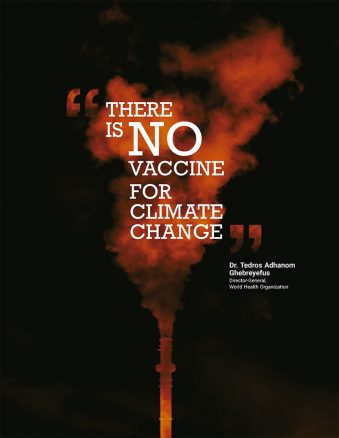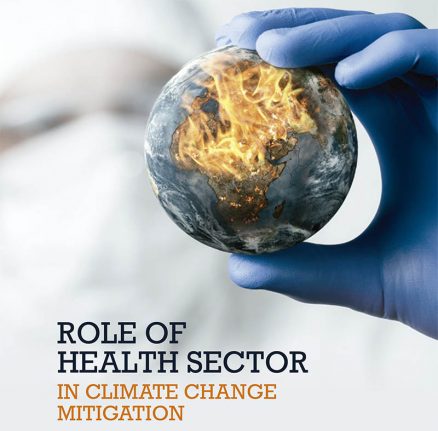Healthy Energy Initiative India, in partnership with health organizations has launched a new guide: “No Vaccine for Climate Change – A Communication Guide on Climate and Health for the Healthcare Professionals in India”.
Healthy Energy Initiative India, in partnership with health organizations, has launched a first of its kind guidance document – “No Vaccine for Climate Change – A Communication Guide on Climate and Health for the Healthcare Professionals in India”. The document is designed to “prepare healthcare workers for various conversations around climate change and subsequent health impacts with their patients, communities and to respond to stakeholders like media, legislators, policymakers and a range of various communication purposes.
“This communication guide is particularly designed to inform the health workers. Together, we have a unique opportunity to help people understand that the same pollution that compromises respiratory health also drives climate change, and, more importantly, spread the word to promote carbon-neutral practices and infrastructure in the health sector.” – Dr. Ravikant Singh, Founder, Doctors For You.
The guidance document is a result of an outcome of the largest study of the Knowledge, Attitude and Practice of Health Care Professionals on Climate Change in India. The findings of the study released in February 2021, indicated that while 93% of health professionals knew the basics of climate change, only about 55% of them actively raised awareness or participated in climate change related activities and events.

Based on the responses, the study provided recommendations to – effectively build capacity among healthcare professionals and advocates, emphasized on the need to provide nuanced information of the multiple ways (direct, indirect and through economic and social disruption) in which health could be adversely impacted due to climate change. It further recommended that Climate Change and health impacts should be a subject in the medical curriculum for education of healthcare professionals from all streams and specializations; Healthcare professionals should be provided with information and training on the international negotiations on climate treaties, especially the Paris Agreement; and Detailed information regarding State and National Action Plans on Climate Change and Human Health, in an easy-to-understand format.
“Health professionals are both trusted communicators and important actors when it comes to protecting public health. It is only fitting, then, that they are equipped with the necessary knowledge and tools to tackle the biggest health challenge of the 21st century, climate change. This communications guide – “No Vaccine for Climate Change” is designed to prepare health and care workers for various conversations around climate change, and its impacts on the health of their patients and their community.” – Dr. Maria Neira, Director Public Health, WHO
The guidance document has incorporated the recommendations of the study and provides a comprehensive overview of the health impacts which can be expected from climate related impacts, like heat waves, floods, drought, cyclones, air pollution. Infectious diseases, allergens etc. and the preparedness required from health care professionals and health systems.

Apart from covering the basic issues of climate induced impact on both physical and mental health, the document also provides a template for healthcare professionals to become effective leaders and communicators on the issue. The document prescribes sets of specific actions for potential health related impacts from climate induced disasters, that healthcare professionals could prescribe to their patients, to communities or to policy makers. It also provides suggestions for health systems.
“Indian health sector can make a substantial contribution to mitigate the effects of climate change by adopting green technologies to reduce various greenhouse gas emissions and decreasing energy consumption by adopting renewable energy. Health care providers also have an opportunity to be effective communicators of good science on the potential health threats and health effects that have already been documented to policy makers, urging them to act.” – Dr. Arvind Kumar, Founder Trustee, Lung Care Foundation
Subject experts from state health departments of Chhattisgarh and Kerala, State Health Resource Center, Chhattisgarh, Post Graduate Institute of Medical Education Research Chandigarh, Punjab University, Health Care Without Harm, Lung Care Foundation, Doctors For You, Medical Students Association of India, Climate Trends, Climate Action Network South Asia and Azim Premji University have contributed to the document.
“This document will act as the crucial first step in orienting our health workers so that they can become trusted communicators on climate change and health impacts. This effort will be a milestone for health, and it will educate and guide them in understanding, communicating and leading on this crucial matter of global survival.” – Gary Cohen, President, Health Care Without Harm.



